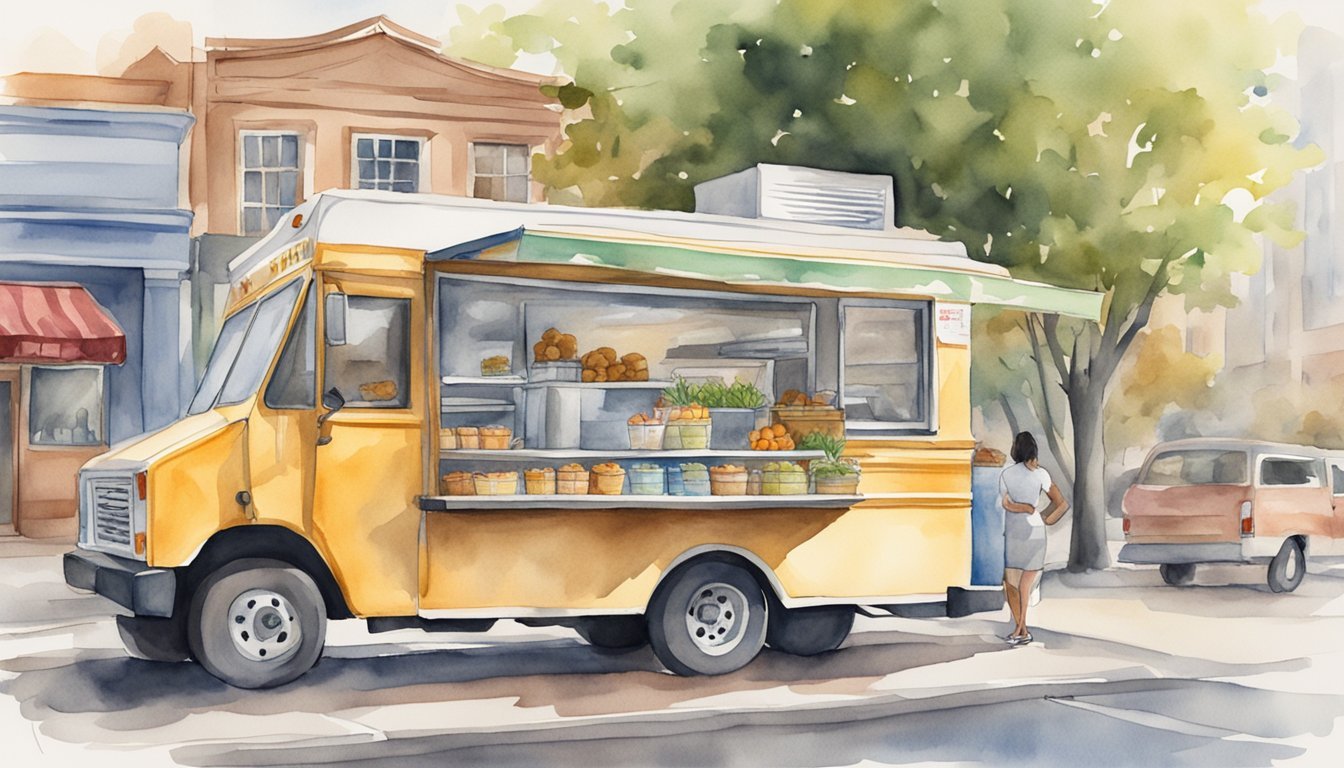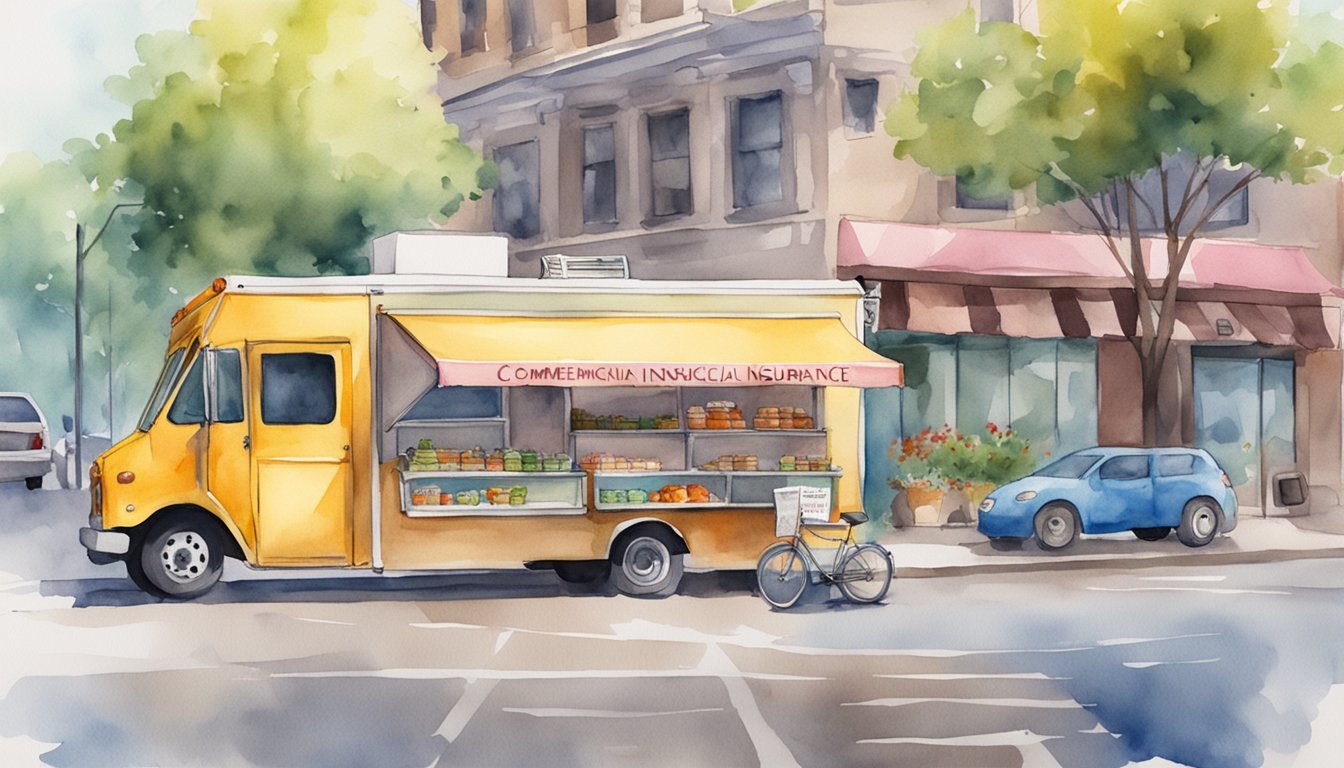Commercial Auto Insurance for Food Trucks: Essential Coverage for Mobile Eateries

Food trucks are a popular and exciting business venture, but they come with unique risks.
Protecting your mobile eatery is crucial, and that’s where commercial auto insurance comes in. Commercial auto insurance for food trucks covers your vehicle, equipment, and liability while you’re on the road serving customers.

Getting the right insurance for your food truck can be tricky.
You need coverage that goes beyond regular car insurance.
It must protect your business assets, employees, and customers. Food truck insurance can include general liability, property coverage, and workers’ compensation.
The cost of food truck insurance varies based on factors like your menu, location, and business size. Food and beverage businesses pay about $165 per month on average for commercial auto insurance.
But your costs may differ.
It’s smart to get quotes from different providers to find the best deal for your needs.
Key Takeaways
- Commercial auto insurance protects your food truck, equipment, and liability
- Coverage options include general liability, property, and workers’ compensation
- Insurance costs vary, so compare quotes to find the best deal for your food truck
Understanding Commercial Auto Insurance for Food Trucks

Food truck owners need specialized insurance to protect their business.
Commercial auto insurance covers unique risks associated with mobile food businesses.
What Is Commercial Auto Insurance?
Commercial auto insurance protects vehicles used for business purposes.
For food trucks, it covers the truck itself and other business-related driving.
This insurance is different from personal auto policies.
- Liability protection
- Collision coverage
- Comprehensive coverage
You’ll need higher limits than a personal policy.
Food trucks carry expensive equipment and inventory.
Your policy should reflect these higher values.
Commercial auto insurance also covers employees who drive for work.
This is crucial if you have staff making deliveries or running errands.
Why Food Trucks Need Specific Coverage
Food trucks face unique risks that require specialized insurance.
Your vehicle is both transportation and your place of business.
Key reasons for specific coverage:
- Mobile kitchen equipment needs protection
- Higher liability risk from serving food
- Frequent stops increase accident chances
Your policy should cover food spoilage if your refrigeration fails.
It should also protect against fire damage from cooking equipment.
Food trucks often operate in busy areas with lots of foot traffic.
This increases your risk of accidents.
Make sure your liability limits are high enough to protect your business.
Types of Coverages Available
Food truck owners need several types of auto insurance to protect their business.
Each coverage type serves a specific purpose and safeguards against different risks.
Liability Coverage
Liability coverage is essential for food truck owners.
It protects you if your food truck causes damage or injury to others.
This coverage pays for property damage and medical expenses of other parties involved in an accident you cause.
Liability insurance also covers legal fees if someone sues you after an accident.
Most states require a minimum amount of liability coverage.
It’s often wise to get more than the minimum to fully protect your business.
Collision Coverage
Collision coverage pays for damage to your food truck from accidents with other vehicles or objects.
This includes hitting another car or crashing into a tree or pole.
If your food truck is damaged in a collision, this coverage helps pay for repairs.
It applies regardless of who is at fault.
Collision coverage typically has a deductible.
You choose the deductible amount when you buy the policy.
Comprehensive Coverage
Comprehensive coverage protects your food truck from non-collision incidents.
This includes theft, vandalism, fire, falling objects, and natural disasters.
For example, if a tree falls on your parked food truck or someone breaks in and steals equipment, comprehensive coverage would help pay for repairs or replacements.
Like collision coverage, comprehensive usually has a deductible.
Uninsured Motorist Coverage
Uninsured motorist coverage protects you if you’re in an accident with a driver who doesn’t have insurance.
It also covers hit-and-run incidents.
This coverage pays for your medical bills and lost wages if you’re injured.
It can also cover damage to your food truck in some cases.
Uninsured motorist coverage is especially important given the high number of uninsured drivers on the road.
Medical Payments Coverage
Medical payments coverage, often called MedPay, covers medical expenses for you and your passengers after an accident.
This applies regardless of who is at fault.
MedPay can cover costs like ambulance fees, hospital stays, and doctor visits.
It’s a no-fault coverage, meaning it pays out quickly without determining who caused the accident.
This can be crucial for food truck owners who need to get back to work quickly after an injury.
Determining the Costs of Food Truck Insurance
Food truck insurance costs vary based on several factors.
Understanding these factors can help you estimate expenses and find ways to save money on premiums.
Factors Affecting Insurance Cost
The type of food you serve impacts your insurance cost.
High-risk items like deep-fried foods may increase premiums.
Your truck’s location and operating hours also matter.
Busy city streets or late-night service can raise costs.
The value of your truck and equipment affects rates.
More expensive vehicles cost more to insure.
Your driving record plays a role too.
A clean record can lead to lower premiums.
Your annual revenue is another factor.
Higher income often means higher insurance costs.
The number of employees you have can increase premiums as well.
Ways to Reduce Premiums
You can lower your food truck insurance costs in several ways.
Installing safety equipment like fire extinguishers and security cameras may reduce premiums.
Regular maintenance of your truck can also help.
Consider raising your deductible.
A higher deductible often leads to lower monthly payments.
Bundling different types of insurance with one provider might offer savings.
Taking advantage of discounts can cut costs.
Many insurers offer discounts for safe driving records or completing safety courses.
Paying your premium annually instead of monthly might also save you money.
Average Cost of Food Truck Insurance
Food truck insurance typically costs between $2,000 and $4,000 per year.
This range covers basic coverage needs for most food trucks.
General liability insurance, a key component, usually runs $300 to $800 annually.
This protects you from customer injury claims and property damage.
Commercial auto insurance for food trucks averages about $165 per month.
This coverage is essential for protecting your vehicle while on the road.
Other types of insurance, like workers’ compensation, can add to your total costs.
The exact amount depends on your specific needs and risk factors.
Insurance Providers and Quotes
Food truck owners need to choose the right insurance provider and get accurate quotes.
This process involves comparing options and gathering necessary information.
Choosing the Right Insurance Provider
When picking an insurance provider for your food truck, look at companies that specialize in commercial auto and food service coverage. FLIP and Simply Business are top choices for food truck insurance.
They offer policies tailored to mobile food businesses.
Progressive is another good option.
They provide custom commercial auto and business insurance for food trucks.
Consider these factors when choosing a provider:
- Experience with food truck insurance
- Range of coverage options
- Customer service quality
- Claims process efficiency
- Financial stability
How to Get a Food Truck Insurance Quote
To get an accurate quote for your food truck insurance:
-
Gather your business details:
- Vehicle information
- Equipment value
- Annual revenue
- Number of employees
-
Contact multiple providers or use an online comparison tool.
-
Be honest about your business operations and risks.
-
Ask about discounts. Many insurers offer savings for safety features or bundled policies.
-
Review and compare quotes carefully. Look at coverage limits, deductibles, and exclusions.
-
Don’t just choose the cheapest option. Make sure you have adequate coverage for your needs.
Additional Coverage Options

Food truck owners need more than just auto insurance.
Here are some key policies to consider for full protection.
Inland Marine Insurance for Equipment
Inland marine insurance protects your food truck equipment when it’s in transit or at different locations.
This covers items like:
- Cooking appliances
- Refrigerators
- Food prep tools
- Cash registers
It safeguards against theft, damage, and loss.
Without this coverage, you’d have to pay out of pocket to replace expensive gear.
Many insurers offer inland marine as an add-on to your commercial auto policy.
Premiums vary based on the value of your equipment.
General Liability Insurance
General liability insurance is crucial for food truck operators.
It protects you from:
- Customer injuries on your property
- Food-related illnesses
- Property damage you cause
For example, if someone slips near your truck or gets sick from your food, this policy covers legal fees and settlements.
Most event organizers require food trucks to have general liability insurance.
Coverage limits typically range from $1 million to $2 million per occurrence.
Business Personal Property Insurance
This policy covers items inside your food truck that aren’t permanent fixtures.
It includes:
- Ingredients and supplies
- Utensils and dishes
- Furniture
- Decor
If these items are stolen, damaged, or destroyed, business personal property insurance helps replace them.
You can often bundle this coverage with your general liability policy in a Business Owner’s Policy (BOP).
This can save you money on premiums.
Additional Insured Coverage
Additional insured coverage extends your policy to other parties.
You might need to add:
- Event organizers
- Property owners where you park
- Commissary kitchens you use
This protects them from lawsuits related to your food truck operations.
Many contracts require you to list others as additional insureds.
It’s usually a simple process to add them to your policy.
Be aware that adding insureds may slightly increase your premium.
Always check your contracts to see who needs to be included.
Handling Claims and Accidents
Food truck owners need to know how to handle insurance claims and accidents.
Quick action and proper steps can make a big difference in the outcome.
The Claims Process
Filing a claim for your food truck should happen fast.
Most policies give you 30 days to file, but sooner is better.
Call your insurance company right away after an accident or damage.
They’ll ask for details about what happened.
Be ready with info like:
• Date and time of the incident
• Location
• Damage to your truck
• Any injuries
• Police report number (if there is one)
Your insurer will assign an adjuster to look at the damage.
They’ll decide if your claim is covered and how much you’ll get.
Keep all receipts for repairs or costs tied to the accident.
Your policy might cover things like:
• Truck repairs
• Medical bills
• Lost income while your truck is out of service
What to Do After an Accident
If you’re in an accident with your food truck, stay calm and follow these steps:
- Check for injuries and call 911 if needed.
- Move to a safe spot if possible.
- Call the police to file a report.
- Get info from others involved:
- Names and contact details
- Insurance info
- License plate numbers
Take photos of the accident scene and any damage.
This helps with your claim later.
Don’t admit fault or discuss who caused the accident.
Let the insurance companies figure that out.
Call your insurance company as soon as you can.
They’ll guide you on next steps and start your claim.
Managing Risks for Food Trucks
Food truck owners face unique challenges.
Taking steps to manage risks can protect your business and employees.
Proper safety measures and regular maintenance are key.
Safety Measures and Training
Train your staff on food safety rules.
Teach them how to handle food properly and avoid contamination.
Make sure they know how to use equipment safely.
Create a checklist for daily cleaning and sanitizing.
Keep a fire extinguisher on board and teach everyone how to use it.
Install smoke detectors and test them regularly.
Have a plan for what to do if there’s a fire or other emergency.
Use non-slip mats in the truck to prevent falls.
Provide staff with closed-toe shoes and other safety gear. Commercial food truck insurance can help protect your business if accidents happen.
Vehicle and Equipment Maintenance
Check your truck’s tires, brakes, and lights often.
Keep up with oil changes and other routine maintenance.
This helps prevent breakdowns and accidents on the road.
Clean and inspect your cooking equipment daily.
Fix or replace worn-out parts quickly.
Keep a maintenance log to track when things need servicing.
Test your refrigeration units to make sure they keep food at safe temperatures.
Clean your grease traps regularly to prevent fires.
Have a professional inspect your gas lines and connections yearly.
Store cleaning supplies away from food items.
Label all containers clearly.
Keep a first aid kit stocked and easily accessible.
Benefits of Insuring Your Food Truck
Insuring your food truck provides crucial protection for your business.
It safeguards your finances, keeps you legal, and gives you peace of mind.
Financial Security
Commercial auto insurance shields your food truck from costly damages.
If you get in an accident, it covers repairs to your vehicle and other property.
It also protects you from lawsuits.
If someone gets hurt because of your truck, insurance can pay their medical bills and legal fees.
Without coverage, you’d have to pay these costs out of pocket.
This could drain your savings or even bankrupt your business.
Insurance also covers theft or vandalism of your truck.
You won’t lose everything if someone steals or damages your mobile kitchen.
Compliance with State Laws and Regulations
Most states require food trucks to have insurance.
By getting covered, you avoid fines and legal trouble.
You may need to show proof of insurance to:
- Get licenses and permits
- Park at events or in certain areas
- Work with other businesses
Meeting these requirements lets you operate freely.
You can focus on cooking and serving customers without worrying about breaking the law.
Some places even require specific types of coverage.
Having the right insurance keeps you compliant everywhere you go.
Peace of Mind for Business Owners
Running a food truck is stressful.
Insurance takes one big worry off your plate.
You can work confidently knowing you’re protected from:
- Accidents
- Customer injuries
- Equipment breakdowns
- Food spoilage
If something goes wrong, you won’t face financial ruin.
This security lets you take risks and grow your business.
Insurance also shows customers you’re professional and responsible.
They’ll trust you more, knowing you take safety seriously.
With the right coverage, you can relax and focus on what matters: making great food and building your brand.
Industry Insights: Food Truck Insurance Trends
The food truck insurance market is changing fast.
New trends are shaping coverage options.
Tech is also playing a big role in how insurance companies serve food truck owners.
Recent Trends in Food Truck Coverage
Food truck owners now need more flexible insurance.
Many policies cover events and festivals.
This helps when you work at different locations.
Insurers are offering more custom plans.
You can now get coverage for specific risks like food spoilage or equipment breakdown.
Some companies are bundling policies.
This can save you money.
A business owner’s policy (BOP) might include general liability and property coverage in one package.
Rates are changing too.
The average cost for food truck insurance varies.
You might pay around $165 per month for commercial auto coverage.
The Role of Technology in Insurance Services
Tech is making it easier to get and manage your food truck insurance.
Many companies now offer online quotes.
You can compare prices and coverage quickly.
Mobile apps let you access your policy info on the go.
This is handy when you’re always on the move with your food truck.
Some insurers use telematics.
These devices track your driving habits.
Safe drivers might get lower rates.
Digital claims processing is becoming common.
You can often file claims online or through an app.
This speeds up the process when you need help fast.
Insurance companies are using data analytics too.
This helps them offer more accurate pricing based on your specific risks.
Case Studies: Food Truck Insurance in Action
Real-life examples show how insurance protects food truck owners.
These stories highlight key benefits and lessons learned.
Success Stories
A taco truck in Los Angeles faced a major setback when their generator caught fire. Commercial auto insurance covered the repairs, allowing them to get back on the road quickly.
In Chicago, a food truck’s refrigeration system failed during a heatwave.
Their insurance paid for repairs and spoiled food replacement.
This saved the business thousands of dollars.
A Portland food truck owner slipped and broke her arm while working.
Her policy covered medical bills and lost wages, preventing financial hardship.
Lessons Learned from Claims
A Houston food truck learned the importance of general liability coverage when a customer sued after getting food poisoning.
The insurance covered legal fees and settlement costs.
In New York, a food truck hit a parked car.
Their business auto insurance covered the damages, avoiding out-of-pocket expenses.
A Seattle food truck faced a lawsuit when their signage fell and injured a passerby.
Their policy covered the claim, showing the value of comprehensive coverage.
These cases prove that proper insurance is crucial for food truck success and protection against unexpected events.






